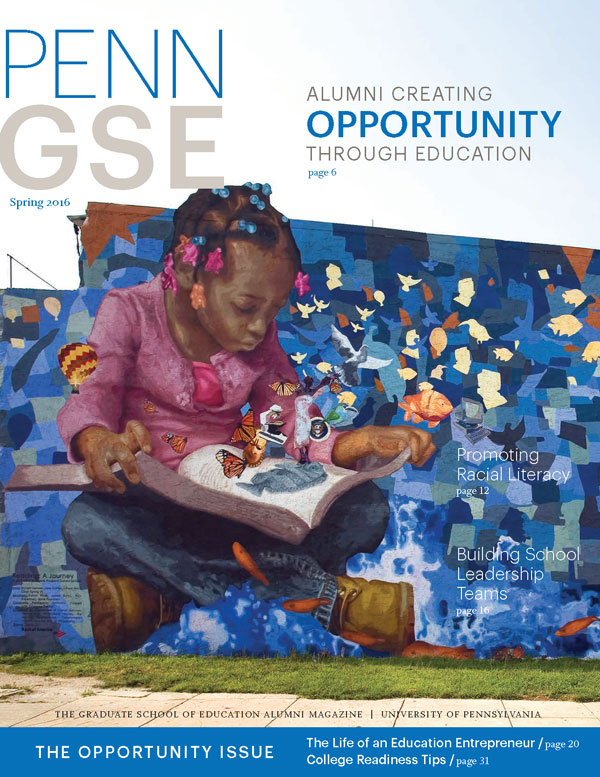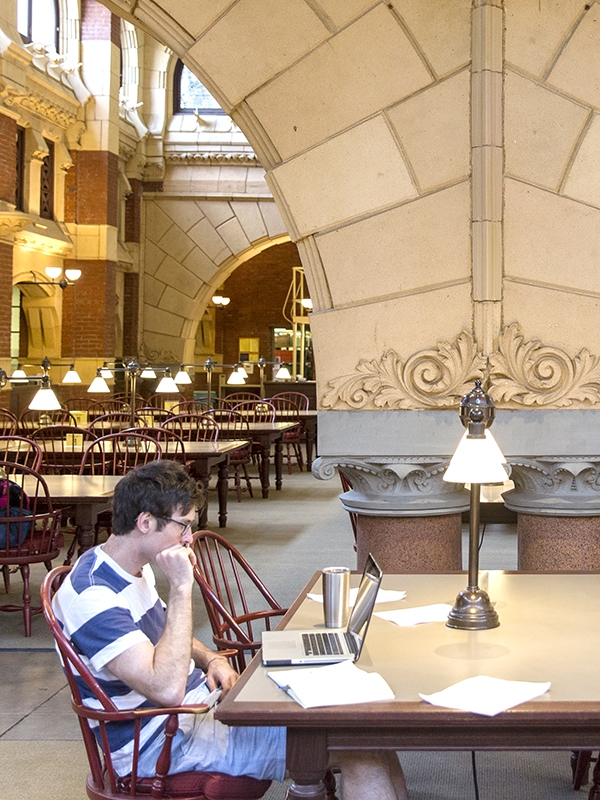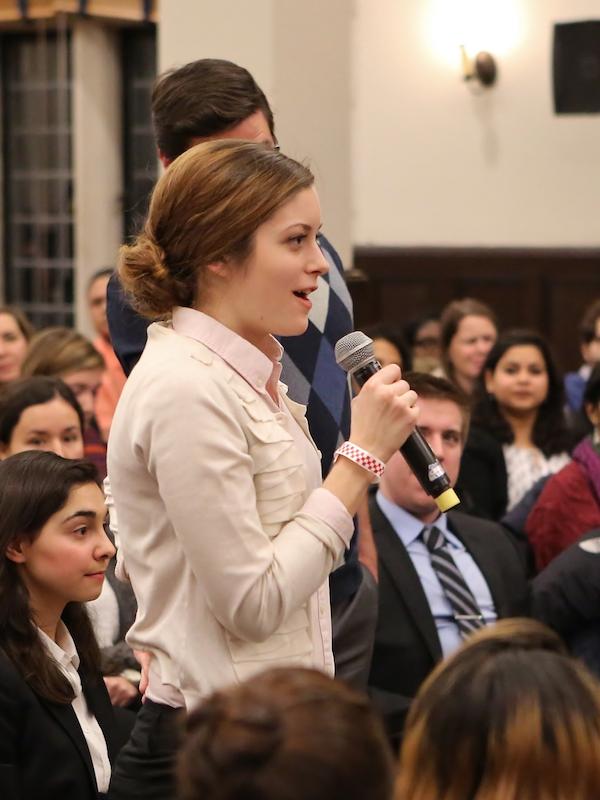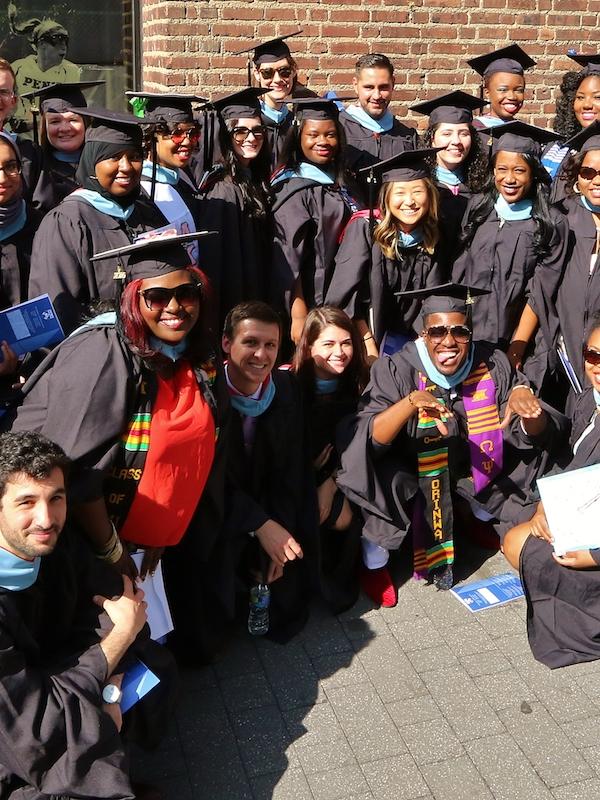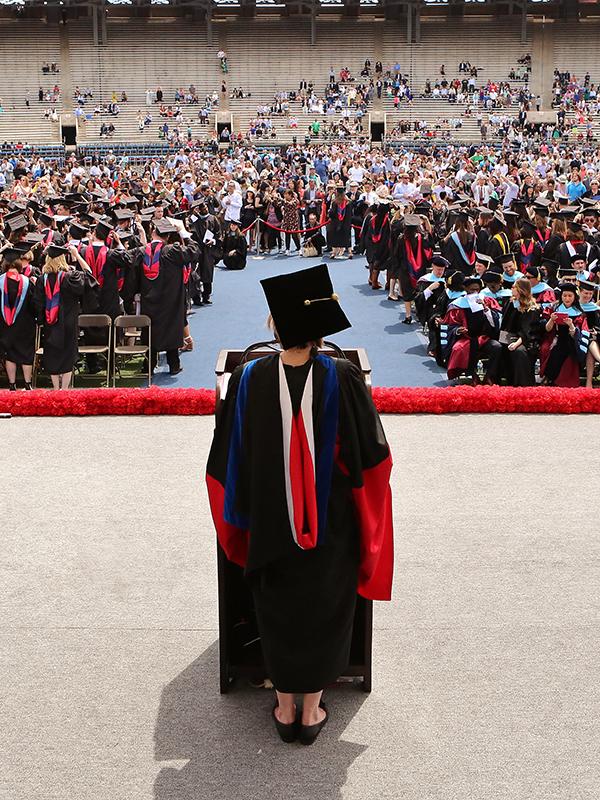Imagining What’s Possible: The Life of an Education Entrepreneurship Student
by Manasee Wagh
“That’s the beauty of the program. Strong theoretical underpinnings are grounded in practical application.”
It is Sunday afternoon, and the classroom thrums with the voices of dozens of students in Penn GSE’s M.S.Ed. in Education Entrepreneurship program. In groups of four and five, they discuss the challenges of bringing education, business, and entrepreneurship together. Chris Parris is out of his seat and at the whiteboard, explaining his business idea to four of his classmates. The group wades through a list of potential obstacles that could make or break Parris’s dream of putting more Boston public school students on a path to college.
“I’m trying to understand the problem of public urban education in Boston,” says Parris. “The diversity of learners, coupled with a limitation of resources, often hinders student achievement.”
As director of the College Success Academy (CSA) for The Steppingstone Foundation, he wants to build on his organization’s record of success to provide even more students with tuition-free academic, social, and emotional support outside of school.
Parris is part of a significant contingent of Education Entrepreneurship students who consider themselves “intrapreneurs,” professionals who seek to create innovation and change from within established education organizations. Others in the program—the first of its kind in the nation—plan to work as entrepreneurs by launching new ventures.
“The program was crafted for working professionals committed to creating truly unique solutions in education,” says Dr. Jenny Zapf, program director and senior academic fellow. “Our students will graduate having learned to apply entrepreneurial knowledge, skills, and tools to some of education’s most pressing challenges.”
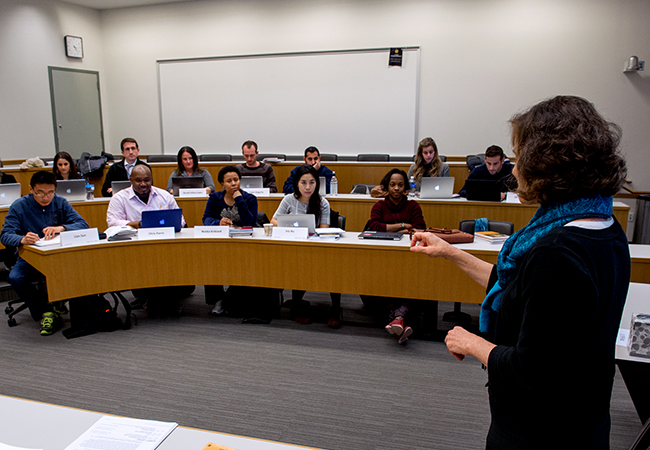
“We developed this master’s degree to provide new ways of building the innovation education ecosystem and supporting the creation and growth of entrepreneurs,” says Dr. Barbara “Bobbi” Kurshan, executive director of academic innovation and senior fellow at GSE.
About halfway through the thirteen-month program, Parris reports that it is equipping him to make his organization the best it can be.
Preparing to Create Change
Over the course of the program, the students—who come from all over the country and many areas of the world—take rigorous courses and develop a culminating capstone project in preparation for launching their ventures. Parris’s project will explore the best ways his organization can improve educational outcomes in a public school system where three out of four students are from low-income households, and the highest rate of public high school graduation was 66 percent in 2014.
Also a trained classroom teacher and classical trumpet player, Parris discovered his passion for helping underserved students during four years at the Boston Arts Academy, where he was band and orchestra director as well as a college coach and SAT prep teacher. Today he is deeply committed to his organization’s mission of providing rigorous programs with meaningful results for students.
“You have to think about how students and teachers will experience your curriculum, from development to actual delivery in the classroom,” he says. “You’re called to make informed decisions based on whom you’re serving, and why and how you want to serve them.”
While many of his classmates’ ideas focus on improving academic skills, some aim to support other factors that affect a child’s ability to receive a good education, such as access to healthy food, social-emotional supports, or transportation. Others propose new approaches to learning and professional development.
Student Amirah Cummings wants to open a school that would nurture young children’s natural ability to learn multiple languages, starting from pre-K and extending to 12th grade. Cummings, who speaks Japanese, Italian, and Spanish thanks to a childhood spent in different countries, comes to the program from a professional background in marketing and nonprofit consulting.
“This program has elevated my level of thinking,” she says. “They asked us, ‘What is your philosophy of education?’ I had to dive deep into myself to figure it out.”
Learning to create and accelerate change requires a rigorous academic schedule. The program’s executive format brings students together for three weekend-long classes per semester, as well as an intensive ten-day session in the summer. On a typical course weekend, Parris flies into Philadelphia from Boston and arrives in time for the 3:00 p.m. start of Friday classes. He and his classmates work until about 8:00 p.m. and get up early on Saturday to dive into a ten-hour day. Classes end on Sunday at 3:00 p.m. As Parris waits for his evening flight home, he often puts together his agenda for the next day’s staff meeting at CSA.
School isn’t out when the weekend ends. In between sessions, students read course material, work remotely on group projects, and complete online courses, all while fulfilling the responsibilities of their jobs.
“The ongoing group work prepares us to work in this field beyond Penn, when we may be collaborating with colleagues in other parts of the country or world,” says Parris. “It also helps us to remain connected and take advantage of the network of our colleagues.”
Theory, Practice, and Three Fields
Later in the day, during an Economics of Education class, Parris presents his new financial model for expanding CSA’s reach. He talks about the points he’s working through, including the ideal student-to-teacher ratio, how costs per student are linked to implementation, and what kind of financial cushion CSA needs to sustain its mission for the long term. The class is part of the program’s Business Essentials component, one of three prongs in the curriculum, along with Foundations of Education and Entrepreneurial Management of Knowledge.
“The program sits at the intersection of education, business, and entrepreneurship,” says Dr. Martin Ihrig, who is academic director of the program, practice associate professor at GSE, and adjunct associate professor at The Wharton School. “It really bridges disciplines, because this is how innovation starts.”
Business Essentials courses build students’ business acumen, teaching them how to recruit management teams and create an effective strategy to market their ventures. Students learn that the crux of any venture is sustainability. “You have to have a balance between providing quality programming and surviving financially,” says Parris.
In Foundations of Education courses, students learn about the legacy of education in the United States, including how culture and society influence teaching and learning. “We examined philosophies of education in a way that strengthened my understanding of my organization and helped me to identify the instructional approaches that would be most effective in our classrooms,” Parris reports.
Entrepreneurial Management of Knowledge courses address how a new business idea is developed, from initial inspiration through the research and technology needed to support it. The courses help students cultivate their ideas for changing education. “We sharpened our ability to identify unmet needs in the education landscape and assess the viability of potential solutions,” Parris says.
To keep students in touch with the realities of the marketplace, guest lectures by working entrepreneurs complement the courses taught by GSE and Penn professors. “That’s the beauty of the program,” says Parris. “Strong theoretical underpinnings are grounded in practical application.”
The classroom serves as a laboratory and community where students can discuss challenges they face and experiment with potential solutions. Martha Rush, another student in the program, particularly appreciates how the students help each other reach their individual goals.
“My classmates are fantastic,” says Rush, a Minnesota high school teacher who is preparing to launch a consulting company to help improve student engagement and motivation. “While I’m presenting, their minds are going a hundred miles an hour, and when I’m done they have so many great suggestions. I never thought I’d have so many people give me ideas and input.” According to Penn GSE Dean Pam Grossman, that creative process is at the heart of the program’s mission. “These are people who care deeply about education and how to improve it, who want to figure out what’s not working and make it better,” she says. “They’re creating what’s possible—not accepting things as they are.”
This article originally appeared in the Spring 2016 issue of The Penn GSE Magazine.

